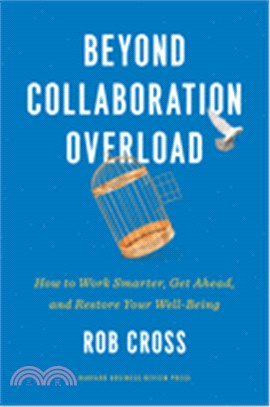目前查詢
歷史查詢

Beyond collaboration overload :how to work smarter, get ahead, and restore your well-being /
- 館藏(1)
- 書目資訊
- 心得(0)
- 機讀格式
- 標籤
書名 : Beyond collaboration overload :how to work smarter, get ahead, and restore your well-being /
紀錄類型 : 書目-語言資料,印刷品: 單行本
正題名[資料類型標示]/作者 : Beyond collaboration overload :Rob Cross.
其他題名 : how to work smarter, get ahead, and restore your well-being /
其他題名 : How to work smarter, get ahead, and restore your well-being
作者 : Cross, Robert L.,
出版者 : Boston, MA :Harvard Business Review Press,c2021.
面頁冊數 : 225 p. :ill. ;25 cm.
內容註 : Part I: Breaking free from collaborative overload: Introduction -- An amazing leader falters -- Why you need essential collaboration -- Challenge beliefs -- Impose new structure -- Streamline collaborative practices -- Part II: Using your new freedom to increase performance and well-being: Introduction to Part II -- Networks of successful people -- Energizing connections -- Thriving in a connected world.
標題 : Job stress.
ISBN : 9781647820121
LEADER 03380cam a2200265 a 4500
001 1128865
008 220923s2021 maua g b 001 0 eng d
020 $a9781647820121$q(hbk.) :$cUSD30.00
020 $a164782012X$q(hbk.) :$cUSD30.00
035 $aNO000222637
037 $b公共圖書館臺南分區資源中心
040 $aDLC$beng$eaacr2$cDLC$dOCLCO$dOCLCF$dYDX$dN$T$dIAI$dMUU$dUKAHL$dOCLCO$dORMDA$dVLB$dOCLCO$dTWTNM
041 0 $aeng
042 $apcc
050 04$aHF5548.85$b.C76 2021
082 00$a650.1/3$223
090 $a臺南市立圖書館
100 1 $aCross, Robert L.,$d1967-
245 10$aBeyond collaboration overload :$bhow to work smarter, get ahead, and restore your well-being /$cRob Cross.
246 30$aHow to work smarter, get ahead, and restore your well-being
260 $aBoston, MA :$bHarvard Business Review Press,$cc2021.
300 $a225 p. :$bill. ;$c25 cm.
504 $aIncludes bibliographical references and index.
505 0 $aPart I: Breaking free from collaborative overload: Introduction -- An amazing leader falters -- Why you need essential collaboration -- Challenge beliefs -- Impose new structure -- Streamline collaborative practices -- Part II: Using your new freedom to increase performance and well-being: Introduction to Part II -- Networks of successful people -- Energizing connections -- Thriving in a connected world.
520 $a"Companies consume 85% of workers' time in collaborative activities. But they have no idea if all this collaboration benefits corporate performance, individual productivity, or employee well-being. Today's corporations are plagued by stress, loss of engagement, and attrition, which cripple them in their quest for a competitive edge. What's going on? Collaboration. Yes, that seemingly Good Thing all companies encourage is creating overload and burnout. It crushes our vitality and well-being, prevents us from being innovative, and blocks our companies from being the most successful organizations they could be. To some this is surprising. It's assumed that it's always better to collaborate more-and faster. But the toll of all this time on collaborative platforms, email, phone and video calls, meetings, and texts after work is far more severe than companies know. So what can be done? In his breakthrough research using network analysis and hundreds of in-depth interviews, Rob Cross has found the answer to collaboration overload. By taking action on three fronts, the best performers streamline collaboration and keep overload from derailing their careers. They use their freed-up time to invest in collaboration activities that drive performance by: mobilizing a broad network for scale, creating "pull" by drawing people and ideas to them, engaging in renewal activities to promote well-being. High performers in today's hyperconnected world create enormous impact through their networks while, amazingly, spending the least amount of time on collaborative tasks. They don't do anything magical. They simply make sure that they collaborate only where they can add unique value-and only where collaboration provides unique value to them. You can do it too. And by applying these collaborators' best practices, you can reclaim a whopping 18 percent to 24 percent of your time-a workday every week-to invest in activities that contribute to your professional success and your overall well-being"--$cProvided by publisher.
650 0$aJob stress.
650 0$aCooperation.
650 0$aSelf-management (Psychology).
650 0$aGroup problem solving.
650 0$aWork$xPsychological aspects.
653 $a知識性
653 $a多元學習
